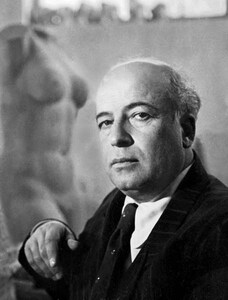Ara Sargsian (Արա Սարգսյան)
Date & Place of Birth
30-Jan-1902 in Sivas, Ottoman Empire
Date & Place of Death
13-May-1969 in Yerevan, Armenia
Biography
Birth and Early Life: Ara Sargsian (Արա Միհրանի Սարգսյան) was born on January 30, 1902, in Sivas, Ottoman Empire, into an era marked by significant political and cultural changes. This tumultuous backdrop would later influence his artistic expression.
Artistic Training: Sargsian's initial training in the arts began in Vienna, a hub of cultural and artistic innovation in the early 20th century. This experience was crucial in shaping his artistic philosophy and technique, particularly in the realm of medal art.
Numismatic Beginnings: While known predominantly for his monumental and theatrical sculptures, Sargsian's foray into numismatics started during his student days. His early medal works, including his portrait of Professor Richard Robert, displayed a keen understanding of the intricacies of medal art and set the stage for his future endeavors in this field.
Development of Style: As Sargsian's career progressed, so did his style in medal art. His works are characterized by a deep understanding of the medium's potential to convey detailed narratives and personalities on a small scale. This is particularly evident in his portrait medallions and commemorative medals.
Numismatic Contributions: Sargsian's contributions to numismatics are significant, both in terms of quantity and quality. His works span a wide range of themes, from portraits and commemorative pieces to medals that capture key historical events and figures. Each piece is a testament to his ability to encapsulate complex stories and characters in a confined space.
Legacy in Armenian Numismatics: Sargsian's influence in the field of Soviet Armenian medal art is profound. He played a pivotal role in developing this art form within Armenia, and his works are revered for their artistic and historical value. His medals are not just artistic representations but also serve as historical documents that reflect the era's cultural and political narratives.
Death and Posthumous Recognition: Ara Sargsian passed away on May 13, 1969, in Yerevan. Posthumously, his contributions to art, particularly in the field of numismatics, have been recognized and celebrated. His works continue to be studied and admired for their unique style, technical mastery, and the depth of expression they achieve.
Through his numismatic art, Ara Sargsian left an indelible mark on Armenian and Soviet art, bridging the realms of sculptural and medallic creativity with unparalleled skill and vision. His legacy lives on, inspiring new generations of artists and numismatists.
Artistic Training: Sargsian's initial training in the arts began in Vienna, a hub of cultural and artistic innovation in the early 20th century. This experience was crucial in shaping his artistic philosophy and technique, particularly in the realm of medal art.
Numismatic Beginnings: While known predominantly for his monumental and theatrical sculptures, Sargsian's foray into numismatics started during his student days. His early medal works, including his portrait of Professor Richard Robert, displayed a keen understanding of the intricacies of medal art and set the stage for his future endeavors in this field.
Development of Style: As Sargsian's career progressed, so did his style in medal art. His works are characterized by a deep understanding of the medium's potential to convey detailed narratives and personalities on a small scale. This is particularly evident in his portrait medallions and commemorative medals.
Numismatic Contributions: Sargsian's contributions to numismatics are significant, both in terms of quantity and quality. His works span a wide range of themes, from portraits and commemorative pieces to medals that capture key historical events and figures. Each piece is a testament to his ability to encapsulate complex stories and characters in a confined space.
Legacy in Armenian Numismatics: Sargsian's influence in the field of Soviet Armenian medal art is profound. He played a pivotal role in developing this art form within Armenia, and his works are revered for their artistic and historical value. His medals are not just artistic representations but also serve as historical documents that reflect the era's cultural and political narratives.
Death and Posthumous Recognition: Ara Sargsian passed away on May 13, 1969, in Yerevan. Posthumously, his contributions to art, particularly in the field of numismatics, have been recognized and celebrated. His works continue to be studied and admired for their unique style, technical mastery, and the depth of expression they achieve.
Through his numismatic art, Ara Sargsian left an indelible mark on Armenian and Soviet art, bridging the realms of sculptural and medallic creativity with unparalleled skill and vision. His legacy lives on, inspiring new generations of artists and numismatists.
Collection
Citation
“Ara Sargsian (Արա Սարգսյան),” Armenian Numismatic Research Organization, accessed January 22, 2025, https://armnumres.org/items/show/1597.


